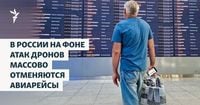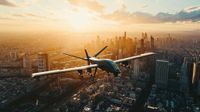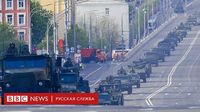A Massive Attack By Ukrainian Drones Disrupts Air Travel And Communication In Russia Ahead Of Victory Day Parade
As Moscow prepares for the Victory Day parade on May 9, 2025, a significant drone attack has led to widespread flight cancellations and communication disruptions across the country, raising concerns about security and safety.
The drone assault began late on the night of May 6 and continued throughout the day on May 7. According to reports, the Russian air defense systems managed to intercept several UAVs (unmanned aerial vehicles) before they could reach Moscow, but the geography of the strikes was extensive, affecting multiple regions including Bryansk, Kursk, and even Crimea. Eyewitnesses reported hearing explosions in the skies above Moscow's Kubinka, a location known to host the Russian Knights and Swifts aerobatic teams, which are set to participate in the upcoming parade.
During a three-hour period starting at 18:40 Moscow time on May 6, Russian forces shot down 57 drones: 31 over Bryansk, 14 over Kursk, seven over Orel, two each over Kaluga and Ryazan, and one over Crimea. This attack marked a significant escalation, with reports indicating that 140 air targets were eliminated overnight in the Bryansk region alone, according to regional Governor Alexander Bogomaz.
As the attack unfolded, the Russian Ministry of Defense stated that five guided long-range Neptune missiles, six JDAM bombs, and two HIMARS rockets were intercepted. However, they did not disclose the exact number of drones downed or the locations where they fell.
In Saransk, the drone alert was declared as local factories, including Opticovolokonnye Sistemy, which produces elements for fiber optic drones, were targeted. The attack highlighted what some experts described as inadequacies in the protection of industrial facilities, attributing the failures to bureaucratic red tape that hampers the establishment of effective defense measures.
As the chaos unfolded, communication networks in Moscow and surrounding regions began to experience significant disruptions. Mobile internet access was severely limited, a move that Kremlin spokesman Dmitry Peskov attributed to "dangerous coexistence" with Ukraine. Reports indicated that residents faced challenges with banking services and mobile payments, as both Sberbank and VTB warned that difficulties could arise due to the mobile internet restrictions.
By the morning of May 7, the general rehearsal for the Victory Day parade was underway, but many residents were unable to communicate or access the internet. One Moscow resident described her struggle to reach her husband, stating, "Mobile internet barely worked, and I could only connect when I found Wi-Fi in a shopping center."
As the drone threat persisted, Russian airlines faced a severe operational crisis. On May 7 alone, hundreds of flights were canceled or diverted, with Aeroflot reporting at least 52 cancellations from Moscow and another 54 flights to the capital. The turmoil at airports was exacerbated by the drone attacks, leading to long queues and frustrated passengers stranded for hours. In Pulkovo, St. Petersburg's airport, over 70 flights were redirected, causing significant delays.
In addition to the flight cancellations, many passengers reported being stuck on planes for extended periods. Singer Nikolai Baskov shared his experience of being unable to leave a plane in Pulkovo for over six hours. Reports indicated that some passengers had to wait in airport lounges overnight, with no clear communication from airline staff.
Mayor Sergei Sobyanin continued to report on the downed drones, stating that 19 UAVs had been shot down near Moscow during the night. However, the Ministry of Defense remained tight-lipped about the specifics of the attacks on military facilities and airfields.
With the Victory Day celebrations approaching, the Kremlin is on high alert. President Vladimir Putin has reportedly instructed the Ministry of Defense to identify potential targets for a retaliatory strike, focusing on Kyiv. As a precaution, Ukrainian authorities began evacuating relatives from the capital in anticipation of possible retaliatory actions.
In the broader context, the drone attacks have raised questions about the effectiveness of Russia's air defense systems and the ongoing security situation. The recent escalation has prompted discussions among military officials and experts about the adequacy of measures in place to protect critical infrastructure.
As the situation continues to develop, the chaos at airports and communication breakdowns serve as a stark reminder of the tensions that have escalated in the region. With foreign leaders expected to arrive for the Victory Day parade, the Kremlin has urged citizens to remain patient and understanding amid the disruptions. Peskov emphasized the necessity of these measures for public safety, stating, "We must take into account the dangerous neighborhood we are in."
As the May 9 celebrations approach, the impact of these drone attacks will likely resonate throughout the events, shaping the narrative of this year's commemorations and highlighting the ongoing conflict and its implications for Russia and its neighbors.



